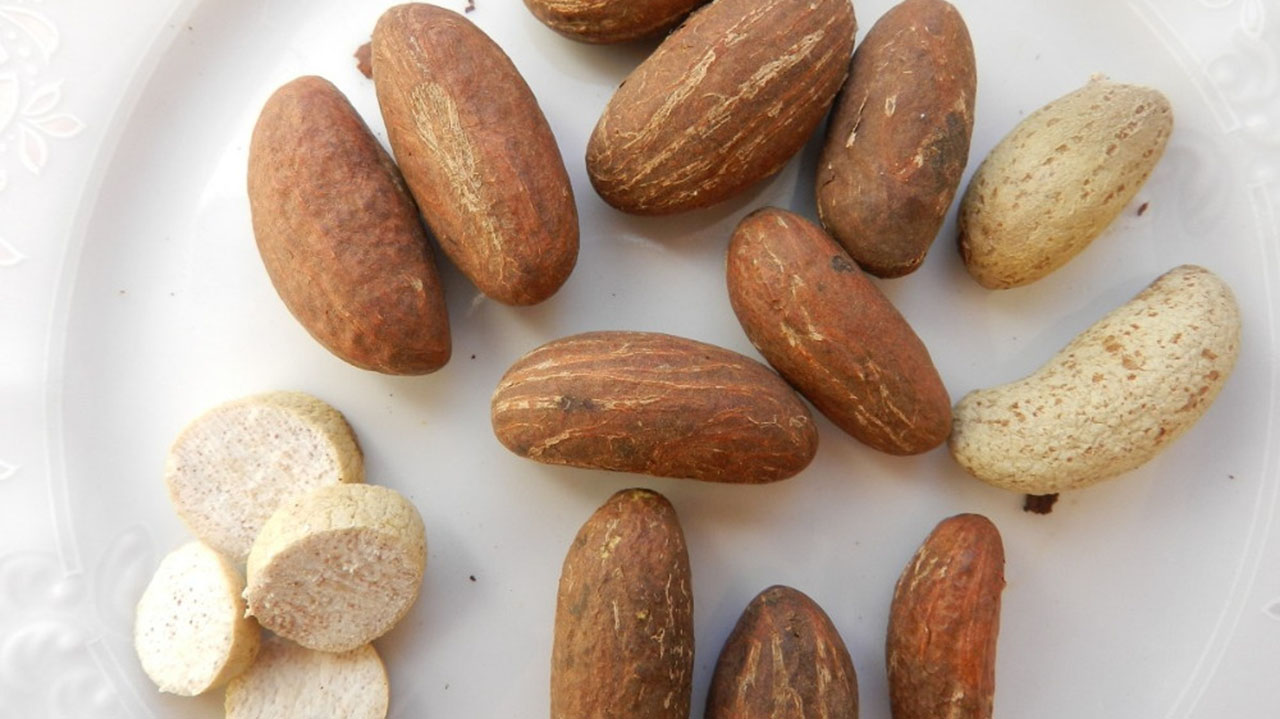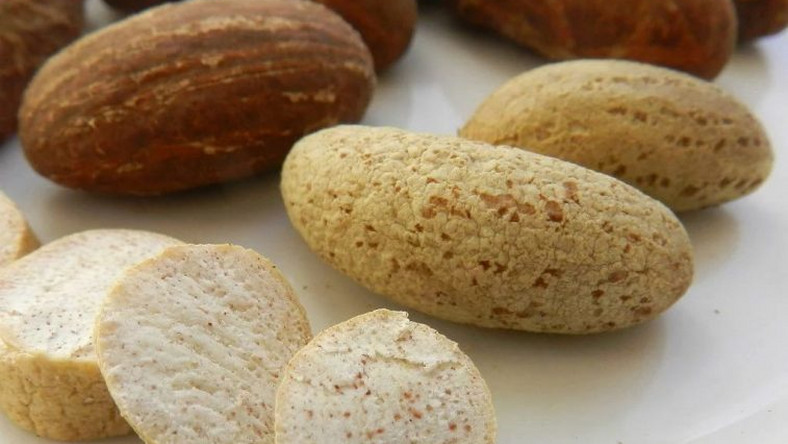HEALTHY LIVING
7 Health Benefits Of Bitter Kola
Published
1 year agoon
By
wpadminee
Bitter kola, scientifically known as Garcinia kola, is a tropical tree native to West and Central Africa. The bitter kola nut is produced by this tree and has been an integral part of African culture for centuries. It is not just a popular snack but is also valued for its various medicinal properties.
In some Nigerian states, bitter kola is used for ceremonies such as traditional marriage, burial ceremonies, house dedications, etc.
There are numerous health benefits of bitter kola, we shall talk about a few of them in this article, shedding light on why this humble nut is considered a superfood.
1. Rich in Antioxidants
Bitter kola is a potent source of antioxidants, which play a crucial role in protecting the body against oxidative stress. These antioxidants help neutralize harmful free radicals that can cause cell damage and contribute to various diseases, including cancer.
By eating it, you can enhance your body’s ability to combat oxidative stress, while promoting your overall well-being.
2. Anti-Inflammatory Properties
Inflammation is the root cause of many chronic diseases, such as arthritis, heart disease, and diabetes. Bitter kola contains compounds with anti-inflammatory properties that can help reduce inflammation and alleviate the symptoms of these conditions.
When consumed regularly, it may aid in managing chronic inflammatory diseases and promoting a healthier, pain-free life.

3. Boosts Immune System
Known for its immune-boosting properties, it contains essential vitamins and minerals, including vitamin C and potassium, which help to strengthen the immune system.
This natural immunity booster, through strengthening the immune system, helps the body ward off infections and illnesses more effectively.
4. Aid in Weight Management
For those on a weight management journey, it can be a helpful addition to their diet. It contains compounds that can aid in weight loss by suppressing appetite and promoting a feeling of fullness.
Additionally, it can boost metabolism, making it easier to shed those extra pounds.
5. Improves Respiratory Health
It has long been used in traditional medicine to alleviate respiratory issues. It can help to relieve symptoms associated with respiratory conditions like asthma, bronchitis, and even the common cold.
Get the latest & greatest updates right away! Join our exclusive WhatsApp Channel & never miss out on exciting news again.
The natural compounds in the superfood help to dilate the airways and reduce congestion, making it easier to breathe.
6. Enhances Cognitive Function
This superfood is believed to improve brain function and memory retention. Some studies suggest that bitter kola may be beneficial in preventing cognitive decline, making it a valuable natural remedy for conditions like Alzheimer’s disease.
This may explain why some students eat it when they study.
7. Potential Anti-Malarial Properties
It has also gained attention for its potential as an anti-malarial agent. Some certain compounds found in bitter kola combat malaria parasites.
While more studies are needed to confirm its effectiveness, this potential application could have a significant impact on public health in regions where malaria is prevalent.
Having ascertained the health benefits of this kola, we shall take a look at a few questions people frequently ask about it:

What is bitter kola good for?
Bitter kola, a traditional remedy from the Garcinia kola tree, has a history of being used to battle infections. It is a powerful ally against a range of health issues, from the common cold to more severe conditions like hepatitis. In 2018, a study confirmed its effectiveness in fighting coughs, bacterial infections, and viral infections.
For generations, bitter kola has been a go-to remedy in various West African cultures. It’s revered for its healing properties and its role in addressing infections.
Can bitter kola reduce sugar in the body?
This superfood offers astonishing benefits for individuals with diabetes. Research has shown that bitter kola can effectively regulate and normalize blood sugar levels when used over an extended period.
For those grappling with the challenges of high blood sugar, bitter kola can provide some much-needed relief.
What are the side effects of taking kola?
While bitter kola consumption offers various benefits, be aware of potential side effects, primarily due to its caffeine content. These side effects can vary in severity, from mild to severe, and may encompass issues like headaches and irregular heartbeats.
Final Thoughts
Bitter kola is a remarkable natural resource with health benefits. From its antioxidant and anti-inflammatory properties to its ability to boost the immune system, aid in weight management, and enhance respiratory health, this unassuming nut has much to offer. It also shows promise as a potential anti-malarial agent and cognitive enhancer.
While it is important to enjoy bitter kola in moderation, incorporating it into your diet can be a wise choice to harness the many advantages it provides.
Get more health updates here.
HEALTHY LIVING
5 Ways To Stay Healthy This Christmas Season
Published
3 months agoon
December 21, 2024By
wpadminee
The Christmas season is full of joy, food, and celebrations, but it can also be a time when health routines fall by the wayside. To stay healthy during the festive period, adopting mindful habits is key.
Here are five actionable strategies to ensure you enjoy the festivities while prioritising your well-being.
1. Make Balanced Food Choices
The holiday season is synonymous with indulgence. While it’s tempting to try everything on the table, opt for a balanced approach. Start meals with proteins and vegetables, which keep you full longer and stabilise your blood sugar.
Enjoy festive treats in moderation, allowing yourself small portions of your favourites without overindulging. By practising mindful eating, you can savour holiday flavours without guilt.
Staying hydrated is equally important. Drink plenty of water to counterbalance rich foods and avoid excessive sugary beverages or cocktails. Alternating alcohol with water is a good way to maintain balance during parties.
2. Prioritise Regular Exercise
Exercise doesn’t have to stop during the Christmas season. Incorporate simple physical activities like morning walks, quick home workouts, or even yoga to maintain your energy levels and reduce stress.
A 10–15 minute walk after meals can aid digestion and manage blood sugar levels. Staying active ensures you feel energised and offsets the effects of holiday indulgences.
3. Manage Holiday Stress
The Christmas season can be hectic, with endless to-do lists and social events. Combat stress by practising mindfulness and setting realistic expectations for your time.
Take breaks when needed, meditate, or engage in activities that help you unwind. Organising your tasks and delegating responsibilities can also alleviate pressure.
4. Get Adequate Sleep
Sleep is crucial for overall health, especially during a busy festive period. Poor sleep can lead to increased cravings and mood swings, making it harder to stick to healthy habits. Aim for 7–8 hours of rest each night.
Create a calming bedtime routine by avoiding screens, dimming lights, and reading a book to relax. Staying consistent with your sleep schedule will keep your energy levels high throughout the Christmas season.
5. Plan Ahead for Healthier Choices
With back-to-back events, it’s easy to fall into unhealthy eating habits. Preparing healthy snacks like nuts, boiled eggs, or fruit ensures you have nutritious options on hand.
Planning meals and snacks ahead of time helps avoid impulsive decisions, keeping your health goals on track even during the busiest days.
Enjoy the Festivities While Staying Healthy
By focusing on mindful eating, staying active, managing stress, sleeping well, and planning ahead, you can enjoy the Christmas season while maintaining your health. Balancing fun with wellness ensures you start the new year feeling your best.
If you found this article helpful, read more here.
FOOD
5 Health Benefits Of Cooking With Garlic
Published
4 months agoon
December 7, 2024By
wpadminee
Garlic is more than just a flavour enhancer; it offers numerous health benefits that have been celebrated for centuries. Incorporating garlic into your meals not only enriches the taste but also boosts your overall well-being.
Let’s explore five key health benefits of garlic, emphasising why this simple ingredient deserves a spot in your kitchen.
1. Boosts Heart Health
Garlic is renowned for its heart-protective properties. It helps lower blood pressure and reduces cholesterol levels, which are crucial factors in maintaining cardiovascular health.
Allicin, a compound found in garlic, relaxes blood vessels, improving blood flow and reducing the risk of heart disease.
Regular consumption of garlic may also prevent artery hardening, a condition known as atherosclerosis. Clearly, one of the primary health benefits of garlic is its contribution to a healthy heart.
2. Strengthens the Immune System
Garlic acts as a powerful immune booster. Its antibacterial, antiviral, and antifungal properties help the body fend off infections. Rich in antioxidants, garlic combats free radicals that can damage cells and contribute to illness.
Cooking with garlic regularly can support your immune system, making it more resilient against common colds and flu. This vital health benefit of garlic makes it a natural defence mechanism.
3. Improves Digestive Health
Garlic promotes healthy digestion by stimulating the production of digestive enzymes. Its antimicrobial properties can help balance gut flora, reducing harmful bacteria and promoting beneficial ones.
Additionally, garlic may reduce inflammation in the gut, alleviating symptoms of conditions like irritable bowel syndrome (IBS).
Including garlic in your diet can improve overall digestive function, emphasising another essential health benefit of garlic.
4. Enhances Bone Health
Surprisingly, garlic may also support strong bones. It contains minerals like calcium, manganese, and selenium, which are vital for bone density and strength.
Some studies suggest that garlic consumption can increase estrogen levels in women, potentially reducing the risk of osteoporosis.
This lesser-known health benefit of garlic highlights its role beyond the kitchen, contributing to long-term skeletal health.
5. Supports Detoxification
Garlic aids the body’s natural detoxification process by activating liver enzymes that help eliminate toxins. Its sulfur compounds enhance liver function, enabling the body to flush out heavy metals and harmful substances more efficiently.
Regularly cooking with garlic can provide a natural cleanse, supporting overall vitality. This detoxifying health benefit of garlic underscores its importance for maintaining internal balance.
Incorporating Garlic into Your Diet
Maximise these health benefits by adding garlic to soups, stir-fries, and sauces. Crush or chop it and let it sit for a few minutes before cooking to enhance its beneficial compounds.
Remember, the health benefits of garlic are most potent when it’s used fresh and minimally cooked.
Cooking with garlic not only elevates your culinary creations but also offers significant health advantages. Embrace this versatile ingredient and enjoy the multiple health benefits of garlic with every meal.
Would you like more articles or additional tips? Check here.
HEALTHY LIVING
How To Stay Healthy While Boosting Productivity
Published
4 months agoon
November 30, 2024By
wpadminee
Balancing health and productivity is essential for personal well-being and professional success. Integrating healthy habits into your daily routine enhances focus, reduces stress, and increases overall efficiency.
Here’s how you can maintain good health while staying productive:
1. Prioritise Physical Health
Exercise Regularly: Physical activity enhances both physical health and mental clarity. Simple practices like taking short walks during breaks or stretching between tasks improve circulation and energy levels.
Maintain Good Nutrition: Eating balanced meals fuels your body and brain. Choose healthy snacks and stay hydrated throughout the day to maintain consistent energy levels.
Sleep Well: Adequate sleep (7-9 hours) improves memory, focus, and mood, contributing to higher productivity. Establish a consistent bedtime routine to ensure restful sleep.
2. Manage Your Energy, Not Just Time
Identify peak productivity periods in your day. Allocate complex or creative tasks to those high-energy times, and save routine work for low-energy periods. This practice optimises your natural rhythms for maximum efficiency.
3. Practice Mindfulness and Stress Management
Take Short Breaks: Regular breaks prevent burnout and boost concentration. Even a five-minute pause every hour can refresh your mind.
Mindful Practices: Meditation or deep-breathing exercises reduce stress and improve focus. Incorporating these into your daily routine fosters mental clarity and emotional resilience.
4. Create a Healthy Work Environment
Ergonomic Workspace: Arrange your workspace to support good posture and reduce strain. Use ergonomic furniture and ensure proper lighting to prevent fatigue.
Limit Distractions: Reduce noise and digital interruptions to stay focused. Tools like “Do Not Disturb” settings and noise-cancelling headphones can help create a conducive work atmosphere.
5. Foster Mental Health
Set Boundaries: Separate work from personal time. Avoid checking work emails after hours to maintain a healthy work-life balance.
Stay Connected: Engage in positive social interactions at work. A supportive environment enhances motivation and reduces feelings of isolation.
6. Optimise Productivity Techniques
Batch Tasks: Group similar activities together to avoid frequent context-switching, which drains mental energy. This method enhances focus and efficiency.
Use To-Do Lists: Organise tasks by priority. Focus on completing high-value activities first to maximise your productivity.
By integrating these health-focused strategies into your daily routine, you can maintain physical well-being, reduce stress, and improve productivity, creating a sustainable path to professional success and personal fulfilment.
Latest


Samsung Galaxy S25 Series Sets The Standard Of AI Phones As A True AI Companion
Samsung Galaxy S25 series sets the standard of AI phones as a true AI companion …Pioneering the multimodal era with...


5 Things To Expect In Afrobeats In 2025
Afrobeats is poised to reach unprecedented heights in 2025 as Nigerian music continues its remarkable global ascent. The genre’s explosive...


Here Are The 7 Most Ancient Countries On Earth
The oldest countries in the world stand as remarkable testaments to human civilisation, each containing landscapes and monuments that narrate...


Why Self-Reflection Is More Important Than Resolutions
Millions of people embark on a yearly ritual: they sit down with a notebook and pen, eager to craft a...


Nollywood Director, Kemi Adetiba Teases King Of Boys 3
Nollywood director Kemi Adetiba has revealed that another instalment of King of Boys will be released on December 25, 2025....


John McEnroe Says He Can Be The Commissioner Tennis Needs Amid Doping Crisis
Recent doping controversies involving top players have not damaged tennis’s reputation, but John McEnroe believes that appointing a single commissioner...


“Everybody Loves Jenifa” Becomes Nollywood’s Highest-Grossing Film Of All Time
Nollywood filmmaker Funke Akindele has achieved a historic milestone with her latest film, “Everybody Loves Jenifa.” The film has officially...


FG To Premiere TV Series, “Hidden Riches” On Mining Sector On January 25
Nigeria’s Federal Government will launch an ambitious television drama series focused on the nation’s mining sector, premiering “Hidden Riches” on...


Qing Madi Delivers A Soulful Performance Of “Favourite Pyscho”
Rising Afro-RnB sensation Qing Madi launches into 2025 with a mesmerising performance on the prestigious COLOURS platform, showcasing her latest...


Taiwo Awoniyi’s First Goal Of The Season Seals Nottingham Forest’s Win Over Wolves
Taiwo Awoniyi made a triumphant return to Premier League action. He scored in stoppage time to help Nottingham Forest crush...
-Ad-
















